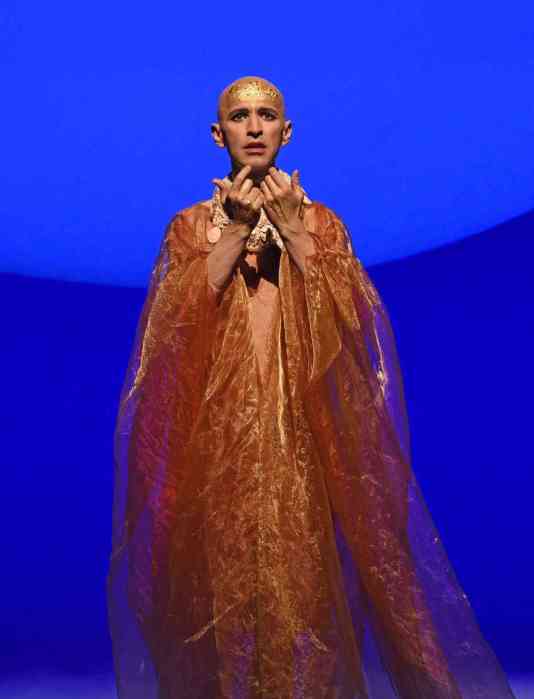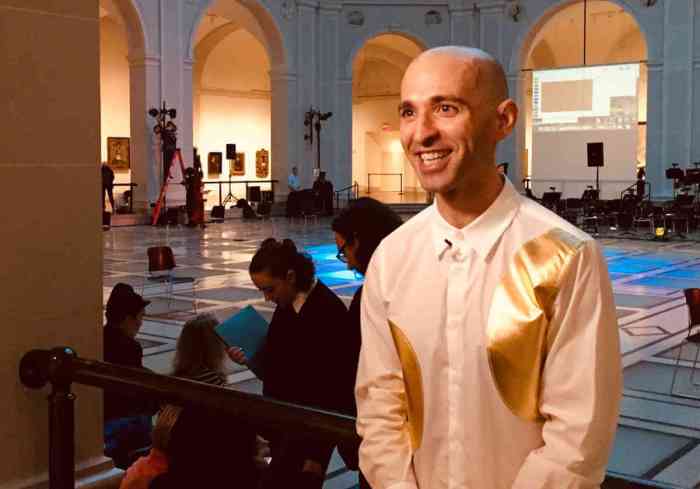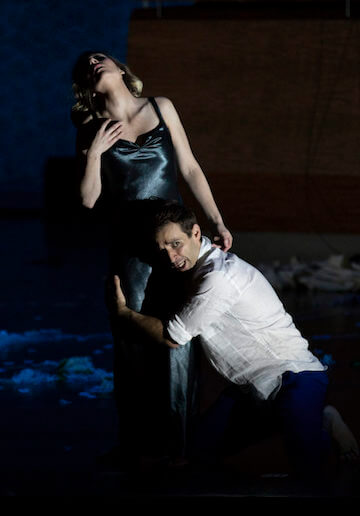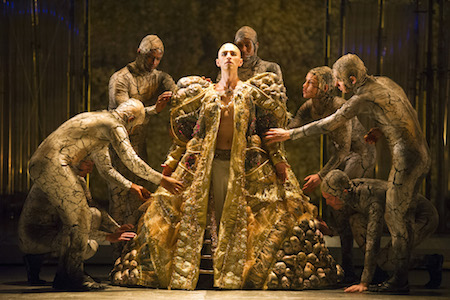Jarrett Ott, Jenna Siladie, and Joseph Beutel in Gotham Opera's “Alexandre bis.” | RICHARD TERMINE
Neal Goren’s always interesting Gotham Opera started its season October 14 at the Lynch Theater with a Bohuslav Martinu double bill that looked great — Gotham shows almost always do — but left one wanting musically. The urbane Czech composer penned works, including “Julietta” and “The Greek Passion,” that deserve renewed local attention soon. But the two 1937 radio-designed works Gotham offered, “Alexandre bis” and “Comedy on the Bridge,” reaped scant rewards.
“Alexandre bis” — performed in French poorly delivered by the entire cast except bass Joseph Beutel — combines old-fashioned Gallic sex farce with Surrealism, with a neo-Classical wash. It doesn’t add up to much. Cameron Anderson’s wonderful black-and-white sets — a scheme largely echoed by Fabio Toblini’s clever, well-cut costumes — gave the staging class that James Marvel’s incessant frenzied “silent comedy” blocking lacked.
“Comedy” shows more compelling music, with a soprano part drawn in classic Czech lyric mode. Jenna Siladie, routine as the first opera’s heroine, proved very appealing here both vocally and dramatically. Its conceit — war is absurd and five interconnected characters with safe-conduct passes get stuck on a bridge between two warring entities — just goes on too long. It might indeed work best on radio, with Czech listeners; improbably, the singers’ Czech easily outperformed their French. Maybe Gotham needed it translated?
Martinu and Handel rarities; a Verdi standard
Goren’s audiences expect attractive young singers, and they got them — perhaps at the price of much vocal distinction. Baritone Jarrett Ott has a cultivated finish to his slightly tremolo-marked sound and he phrased well. Abigail Fischer’s churning mezzo suited the Czech idiom perfectly. Perhaps a gay newspaper shouldn’t complain that Marvel gave Beutel the most gratuitous shirt removal since Sam Ramey’s heyday and blocked more male pelvic thrusting than any operatic staging ever.
Gotham has had and will have better evenings. Don’t miss December’s revival of Montsalvatge’s “El Gato con Botas,” brilliantly realized by Moises Kaufmann and Sean Curran.
Meanwhile, a long weekend in San Francisco afforded two worthwhile productions, Handel’s “Partenope” — a company premiere — and Verdi’s “Un ballo in maschera,” which it has done roughly every five years for decades. The two were presented in strikingly contrasting production style. Christopher Alden’s half-brilliant, half self-indulgent take on “Partenope” (October 18), was visually inventive almost to a fault, while the next afternoon featured the stodgy work of José Maria Condemi in uncredited “Classic Comics” sets and John Conklin’s lush traditional costumes.
Alden cleverly sets Handel’s parodic, multivalent love story in a blend of Noël Coward smartness and highly allusive Surrealist weirdness. Jon Morrell’s costumes were splendid for the two women, Danielle de Niese (Partenope) and Daniela Mack (Rosmira). But, presumably under Alden’s direction, he and Jeanna Parker (wigs, make-up) managed to make four notably handsome men — David Daniels (Arsace), Anthony Roth Costanzo (Armindo), Alek Shrader (Emilio), and Philippe Sly (Ormonte) — look pretty dowdy and pasty: Daniels and Shrader’s wigs competed for road kill bizarrerie. But that’s the C. Alden Sensibility: desire renders men dire.
Young bass-baritone Sly showed excellent voice and style. His character, played as a loopy queen, was made the — as it were — gay butt of jokes, maybe accurate for Surrealism but faintly “minstrel” in the execution.
De Niese looked ravishing and moved well; she’d clearly worked hard to make her characterization more than her usual soubrette manner — more a chatelaine — but it never lasted long before she’d be back to honoring the Muse of Dance and seducing the audience rather than the other characters. Despite a few nice moments, the shallow, grainy vocal quality just isn’t special, certainly not on sustained phrases. Partenope has a transcendent self-revealing aria, “Qual farfalletta,” and at Glimmerglass Lisa Saffer, with a voice no larger or richer in colors than de Niese’s, brought the audience to tears through phrasing, concentration, and some gravitas amidst the comedy. Mack’s impassioned singing and acting, by contrast, was dynamic and technically accomplished.
“Partenope” has served Daniels well at Glimmerglass, Vienna, and Chicago, and remains an excellent vehicle. Bravura dazzle is somewhat lessened, but he served up an exciting “Furibondo spira il vento,” and the legato “Ch’io parta?” remains an exquisite legato time-stopper. It was a fine night for Daniels.
Costanzo, master of his slenderer but fluent tone, executed scary/ funny pratfalls and tap-danced amidst expert coloratura; Armindo’s tender nature emerged in the ravishing finish on soft phrases. Somebody cast this expressive countertenor as Medoro in “Orlando”!
Another skilled comedian, Shrader — with excellent vocal agility and definition — has much to offer in Handelian repertory, but conductor Julian Wachner assigned or allowed him ill-advised cadenzas suitable for Rossini or just placed too adenoidally high.
Wachner occasionally overpowered ensembles but fared pretty well with his modern forces — save for some sorely pressed horns.
“Ballo,” led idiomatically if somewhat fitfully by Nicola Luisotti, requires less comment: more than correct work by principals and chorus, but lacking much frisson of excitement. Most of it came from Julianna di Giacomo’s Amelia, sung with strength and beauty if occasional passing pressure on top. She’s a real deal Verdian spinto.
Heidi Stober and veteran Dolora Zajick coped more than capably with Oscar and Ulrica’s music. Ramon Vargas’ Gustavo showed physical imagination, singing with musical distinction except when stretched for topmost notes. Popular with the crowd, soi-disant Verdi baritone Thomas Hampson offered woody-sounding constricted loud singing and overinflected words: a fussy, Fischer-Dieskauish Anckarstroem.
Condemi thought up some undergraduate business — like the tall conspirators tossing short Oscar’s hat around — that distracted at key moments. Plot points went begging: Ulrica’s pointed asides to the conspiring counts had them standing far across the stage. Amelia thought she sees a ghost downstage left, but Gustavo — the “ghost” — entered above and behind her. Plus, the masked ball called forth a tacky gold lame confetti drop. Verdi’s sovereign score prevailed in the end.
SFO has thrilling June news: Berlioz’ magnificent “Troyens” with Donald Runnicles leading Bryan Hymel, Susan Graham, Anna Caterina Antonacci, and Sasha Cooke. Simultaneously, at the Symphony: a Nina Stemme/ Brandon Jovanovich “Fidelio” under Michael Tilson Thomas.
David Shengold (shengold@yahoo.com) writes about opera for many venues.



































